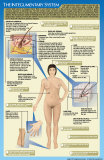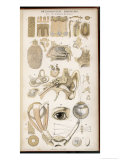|
|
Sense of Touch & Skin Anatomy Posters & Charts
for science classrooms, homeschoolers and professional offices.
|
science > biology > anatomy > SKIN & TOUCH < health posters
|
|
Skin and Touch
The skin is the body's largest organ. In an adult it weighs anywhere from six to ten pounds and measures as much as twenty square feet.
Inside the dermis there are millions of microscopic receptors that tell us if something is hot or cold, heavy or light, rough or smooth.
The dermis is really where the sense of touch takes place. The skin contains a variety of nerve endings that detect touch, pressure, cold , heat, or pain. The nerve endings convert sensations into electrical impulses that are then sent to the brain.
When the skin is damaged, cells release chemicals. These activate nerve endings that detect pain.
The first touch receptors appear in the fetus by ten weeks. Neural connections are made in the third trimester.
|
|
|
|
Skin Quotes
|
• “We must be willing to get rid of the life we've planned, so as to have the life that is waiting for us. The old skin has to be shed before the new one can come.” Joseph Campbell
~~~
• “I have a dream that my four little children will one day live in a nation where they will not be judged by the color of their skin but by the content of their character.” M. L. King, Jr.
~~~
• “Beauty is only skin deep, but ugly goes clean to the bone.” Dorothy Parker
~~~
• “What is the difference between a taxidermist and a tax collector? The taxidermist takes only your skin” Mark Twain
~~~
• “Nor do people put new wine into old wineskins; otherwise the wineskins burst, and the wine pours out and the wineskins are ruined; but they put new wine into fresh wineskins, and both are preserved.” Saying of Jesus, Matthew 9:17, NASB
~~~
|
|
|
Skin and Common Disorders
Shows cross sections of the skin, nail and hair anatomy. Describes the role of the epidermis, dermis and subcutaneous layer. Illustrates and describes types of skin lesions: fissure, ulcer, cyst, macule, papule, wheal, vesicle, pustule, bulla and nodule. Also shows and describes acne (closed & open comedo), actinic keratosis (solar keratosis), junctional nevus (mole), basla cell carcinoma, squamous cell carcinoma, verruca vulgaris (wart), seborrheic keratosis, dermatofibroma, and urticaria (hives).
|
|
|
|
Integumentary System
Poster Text: The integumentary system consists of your skin, hair and nails. As your body's outer covering, it helps maintain fluid balance by keeping interior fluids in and exterior fluids out. It also produces melanin pigment that protects against excessive exposure to ultraviolet rays. The skin excretes water and other substances through sweat glands and sebaceous glands. Sweating helps control your body temperature and sebaceous glands produce sebum to keep your hair soft, so it doesn't break off. In addition, the skin produces vitamin D (with help from the sun's ultraviolet rays), which is crucial to keep your bones healthy. Finally, the integumentary system communicates with the nervous system to send messages about what's going on in the exterior environment, such as heat and cold, touch, pressure, and pain. ...
• Body System poster series
|
|
|
|
The Human Hair
Shows detailed anatomical view of hair within the skin and of the hair shaft. Illustrates types of scalp hair and hair fiber characteristics. Shows miniaturization of hair follicles in baldness and also the hair-growth cycle.
|
|
|
|
Understanding Skin Cancer
Defines skin cancer and provides detailed illustrations of how it develops from sun exposure. Shows and discusses various types of ultraviolet radiation and how each kind penetrates skin layers. Illustrates and shows photos of various types of precancer and cancer. Lists the ABCs of malignant melanoma and provides graph which indicates the rising incidence of skin cancer. Shows how skin naturally works to prevent skin cancer, and illustrates difference between sunscreen and sun block protection.
• sun posters
• diseases posters
|
|
|
|
Dermatome
Defines dermatomes and illustrates cutaneous areas of peripheral nerve innervation, development of dermatomes in extremities.
• nervous system posters
|
|
|
|
|
|
|
Overview of Five Senses
One thing all senses share is that when they detect something, they translate it into a common form–the nerve signal, which travels along sensory nerves to the brain. These nerve messages are the body's “language.” Sense organs transform stimuli (such as sound waves, light rays, flavors, odors, or physical contact) into electrical nerve signals, which are instantly flashed to the brain for interpretation and identification.
• Sight • Hearing • Taste • Smell • Touch
|
|
|
|
The Colour of the Skin
“The colour of the skin is in no way connected with strength of the mind or intellectual powers.”
Benjamin Banneker
|
|
|
|
The custom of women painting their nails red and using red lipstick may be related back to the worship of the Greek god Dionysus by the Maenads, women who in ecstatic frenzy particpated in the violent rending of sacrifice by tooth and nail.
|
|
|
previous page | top
|
|
I have searched the web for visual, text, and manipulative curriculum support materials - teaching posters, art prints, maps, charts, calendars, books and educational toys featuring famous people, places and events - to help teachers optimize their valuable time and budget.
Browsing the subject areas at NetPosterWorks.com is a learning experience where educators can plan context rich environments while comparing prices, special discounts, framing options and shipping from educational resources.
Thank you for starting your search for inspirational, motivational, and educational posters and learning materials at NetPosterWorks.com. If you need help please contact us.
|
|
|















